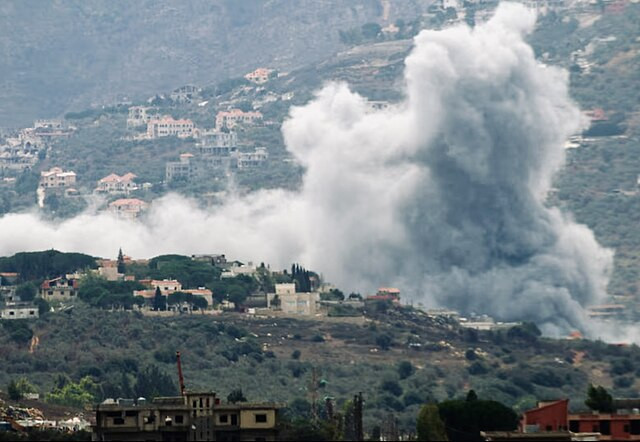The United States, France, and a coalition of allies on Wednesday jointly called for an immediate 21-day cease-fire between Israel and Hezbollah, aiming to halt a surge in hostilities that has resulted in over 600 deaths in Lebanon in recent days. The appeal was made in a joint statement negotiated on the sidelines of the United Nations General Assembly.
The statement described the recent fighting as "intolerable and presents an unacceptable risk of a broader regional escalation." It urged all parties, including the governments of Israel and Lebanon, to "endorse the temporary cease-fire immediately" to provide space for diplomacy.
There was no immediate response from the Israeli or Lebanese governments, nor from Hezbollah. However, senior U.S. officials indicated that all parties were aware of the cease-fire proposal. The officials expressed hope that the cessation of hostilities could lead to longer-term stability along the volatile Israel-Lebanon border.
"The U.S. is the key... to our salvation," Lebanese Foreign Minister Abdallah Bou Habib said during an event hosted by the Carnegie Endowment for International Peace in New York. He emphasized that only Washington could help end the fighting, adding that up to half a million people have been displaced in Lebanon due to the conflict.
Israeli Prime Minister Benjamin Netanyahu's office stated that the cease-fire proposal was under consideration. "This is an American-French proposal that the Prime Minister has not even responded to," his office said in a statement. Netanyahu, who is en route to the United States for the United Nations General Assembly, has not yet issued a formal response.
However, Israeli Foreign Minister Israel Katz rejected the cease-fire call outright. "There will be no ceasefire in the north," Katz wrote on social media platform X. "We will continue to fight against the Hezbollah terrorist organization with all our strength until victory and the safe return of the residents of the north to their homes."
Shortly after the statement from Netanyahu's office, the Israeli military announced a new wave of airstrikes against Hezbollah targets in Lebanon. The Israeli Defense Forces said they are continuing operations "in accordance with operational plans."
Western diplomats expressed frustration over the Israeli response. "This looks like deliberate harm to the negotiations," an unnamed diplomat told Haaretz, referring to Katz's remarks. A diplomat from a country backing the cease-fire proposal added, "These remarks aren't helpful."
The allies calling for the cease-fire include the United States, Australia, Canada, the European Union, France, the United Kingdom, Germany, Italy, Japan, Saudi Arabia, the United Arab Emirates, and Qatar. Work on the proposal accelerated this week, with U.S. Secretary of State Antony Blinken and National Security Adviser Jake Sullivan engaging with world leaders to garner support.
Blinken first raised the proposal with French Foreign Minister Jean-Yves Le Drian on Monday and broadened outreach during a dinner with foreign ministers from the Group of Seven industrialized nations. "We call for an immediate 21-day cease-fire across the Lebanon-Israel border to provide space for diplomacy," the joint statement read.
Israeli Finance Minister Bezalel Smotrich also dismissed the cease-fire initiative. "The enemy must not be given time to recover from the heavy blows he received and to reorganize for the continuation of the war after 21 days," Smotrich said in a statement. National Security Minister Itamar Ben-Gvir's faction announced an emergency meeting to address the proposal, with members already expressing opposition.
The conflict has seen Israel launch its heaviest airstrikes against Lebanon since the 2006 war, killing more than 600 people. Hezbollah has fired hundreds of missiles at targets in Israel, including Tel Aviv, although Israel's aerial defense systems have limited the damage. The exchanges have driven tens of thousands of people from their homes and raised international concerns about a broader Middle East war.
At the United Nations, French Foreign Minister Jean-Yves Le Drian urged both parties to accept the cease-fire without delay, stating that "war is not unavoidable." Lebanese Prime Minister Najib Mikati publicly supported the proposal, calling for an end to "this dirty war" during a special meeting of the U.N. Security Council.
President Joe Biden warned in an appearance on ABC's "The View" that "an all-out war is possible" but expressed hope for a settlement that could "fundamentally change the whole region." He suggested that achieving a cease-fire between Israel and Hezbollah could pave the way for ending the nearly year-long war between Israel and Hamas in Gaza.
The U.S. government also increased pressure on Iran, announcing additional sanctions targeting entities involved in illicit shipments of Iranian petroleum that financially benefit Iran's Revolutionary Guard and Hezbollah.
As diplomatic efforts face hurdles, the potential for escalation remains high. The coming days are critical as international actors continue to push for a cease-fire, while on the ground, military actions persist.




